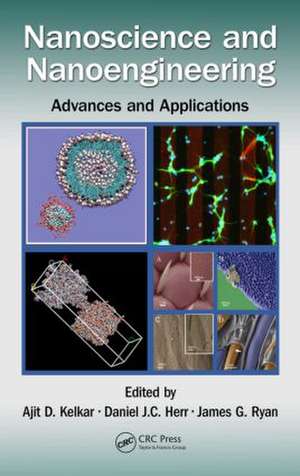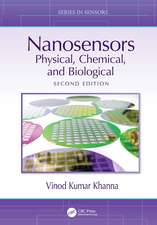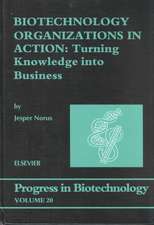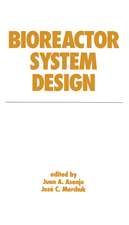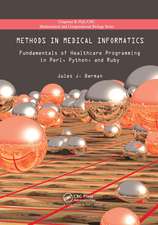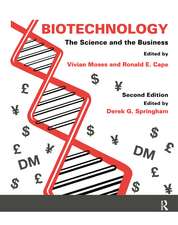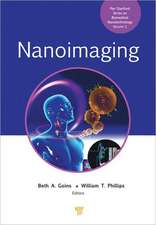Nanoscience and Nanoengineering: Advances and Applications
Editat de Ajit D. Kelkar, Daniel J.C. Herr, James G. Ryanen Limba Engleză Hardback – 28 mai 2014
- Addresses concerns regarding the use of nanomaterials
- Discusses the advantages of nanocomposites versus conventional materials
- Explores self-assembly and its potential for nanomanufacturing applications
- Covers compound semiconductors and their applications in communications
- Considers display technology and infrared optics in relation to nanoelectronics
- Explains how computational nanotechnology is critical to the design of process materials and nanobiotechnologies
- Describes the design and fabrication of nanoelectromechanical systems (NEMS) and their applications in nanomedicine
Preț: 1407.29 lei
Preț vechi: 2046.45 lei
-31% Nou
Puncte Express: 2111
Preț estimativ în valută:
269.27€ • 282.66$ • 223.51£
269.27€ • 282.66$ • 223.51£
Carte tipărită la comandă
Livrare economică 10-24 aprilie
Preluare comenzi: 021 569.72.76
Specificații
ISBN-13: 9781482231199
ISBN-10: 1482231190
Pagini: 332
Ilustrații: 127
Dimensiuni: 156 x 234 x 24 mm
Greutate: 0.61 kg
Ediția:1
Editura: CRC Press
Colecția CRC Press
ISBN-10: 1482231190
Pagini: 332
Ilustrații: 127
Dimensiuni: 156 x 234 x 24 mm
Greutate: 0.61 kg
Ediția:1
Editura: CRC Press
Colecția CRC Press
Cuprins
The Mechanical and Biological Paradigms. NEMS: Processes and Devices. A Study of Ga Assisted Growth of GaAs/GaAsSb Axial Nanowires by Molecular Beam Epitaxy. Applications of Micro/Nanotechnology in Design and Control of Neural Interfaces. Characterization of Biological and Condensed Matter at the Nanoscale. Biological Nanostructures: Formation, Function, and Potential Applications. Current Nanodelivery Systems for Imaging and Therapeutics. Nanodevices and Systems for Clinical Diagnostics. Fullerenes and Their Potential in Nanomedicine. Modeling at Nanoscale: Material Chemistry Level Modeling in Processing and Mechanics of Engineered Materials. Computational Modeling of Bio-Nano Interfaces. Multiscale Glass Fiber Reinforced Composite Developed from Epoxy Resin Containing Electrospun Glass Nanofibers. Templated Self-Assembly for Nanolithography and Nanofabrication: Overview and Selected Examples. Understanding Toxicity of Engineered Nanomaterials. The Safety of Nanomaterials: What We Know and What We Need to Know.
Recenzii
"This book is a wonderful balance between nanoscience and nanoengineering. It is very useful, especially for researchers and graduate students, to understand cross-cutting potential in developing nanotechnology applications. … This is a timely…book on this subject. It is written by a multidisciplinary team of scientists and engineers. … There are very few academic programs exclusively dedicated to nanoscience and nanoengineering. Joint School of Nanoscience and Nanoengineering is one such dedicated program. Most of the authors have an affiliation with this school. This brings reliability and authenticity to the book."
—Dr. Jitendra S. Tate, Ingram School of Engineering, Texas State University, San Marcos, USA
"... presents the state-of-art technological and scientific advances in the field of nanotechnology covering a range of topics—nanoelectronics, nanobio, nanomedicine, modeling at nanolevel, engineering nanomaterials, and nanotoxicology—that are representative areas in which significant advances in nanotechnology have been made in recent years. It will be useful for students and researchers to learn about a variety of fields of research in nanotechnology."
—Mahesh Hosur, Tuskegee University, Alabama, USA
"... a comprehensive encyclopedic monograph of the achievements of the research in nanotechnology oriented towards the application in medicine and biomedical engineering. ... The monograph was written by a collective of competent specialists and would be very useful for readers with wide-ranging scientific interests as well as for the organizers of clinics and enterprises producing medical equipment and drugs."
—Nguyen Van Hieu, Editor-in-Chief, Advances in Natural Sciences: Nanoscience and Nanotechnology, Vietnam
"Using authors that span materials and biological science, this book succeeds in covering the full spectrum of nanomaterial topics in 15 chapters. To achieve this, a major emphasis is placed on bio-nanoscience, nanomanufacturing, and the associated nano-safety concerns. ... Experienced researchers in the nanoscience and nanoengineering field will find this book a useful survey of some of the sub-fields."
—James R. McBride, Vanderbilt University, Nashville, Tennessee, USA, from the Journal of Cluster Science (2015) 26:1023–1025
—Dr. Jitendra S. Tate, Ingram School of Engineering, Texas State University, San Marcos, USA
"... presents the state-of-art technological and scientific advances in the field of nanotechnology covering a range of topics—nanoelectronics, nanobio, nanomedicine, modeling at nanolevel, engineering nanomaterials, and nanotoxicology—that are representative areas in which significant advances in nanotechnology have been made in recent years. It will be useful for students and researchers to learn about a variety of fields of research in nanotechnology."
—Mahesh Hosur, Tuskegee University, Alabama, USA
"... a comprehensive encyclopedic monograph of the achievements of the research in nanotechnology oriented towards the application in medicine and biomedical engineering. ... The monograph was written by a collective of competent specialists and would be very useful for readers with wide-ranging scientific interests as well as for the organizers of clinics and enterprises producing medical equipment and drugs."
—Nguyen Van Hieu, Editor-in-Chief, Advances in Natural Sciences: Nanoscience and Nanotechnology, Vietnam
"Using authors that span materials and biological science, this book succeeds in covering the full spectrum of nanomaterial topics in 15 chapters. To achieve this, a major emphasis is placed on bio-nanoscience, nanomanufacturing, and the associated nano-safety concerns. ... Experienced researchers in the nanoscience and nanoengineering field will find this book a useful survey of some of the sub-fields."
—James R. McBride, Vanderbilt University, Nashville, Tennessee, USA, from the Journal of Cluster Science (2015) 26:1023–1025
Notă biografică
Dr. Ajit D. Kelkar is professor and chair of the Nanoengineering Department at the Joint School of Nanoscience and Nanoengineering. He also serves as associate director for the Center for Advanced Materials and Smart Structures at North Carolina A&T State University and is a member of NIA, ASME, SAMPE, AIAA, ASM, and ASEE. Currently he is involved in the development of nanoengineered multifunctional materials using carbon nanotubes (CNTs), boron nitride nanotubes (BNNTs), electrospun nanofiber materials, and alumina nanoparticles. He also is working on atomistic modeling of polymers embedded with CNTs, BNNTs, and alumina nanoparticles; is involved in high-velocity impact modeling of ceramic matrix composites and polymeric matrix composites embedded with electrospun nanofibers; has published over 200 papers in these areas; and has edited a book on nanoengineered materials.
Dr. Daniel Herr is professor and chair of the Nanoscience Department at the Joint School of Nanoscience and Nanoengineering. Previously he served as director of nanomanufacturing sciences for Semiconductor Research Corporation (SRC). His research is focused on designed nanoengineered materials, advanced patterning and directed self-assembly, nanomanufacturing, formulation, process qualification and optimization, sustainable technologies, and advanced device design. Recently he was elected SPIE fellow and the AAAS Industrial Science and Technology section’s member-at-large. He is the inventor of several foundational patents and disclosures on defect tolerant patterning, controlled nanotube synthesis and placement, deterministic semiconductor doping, and ultimate CMOS devices. He serves as senior editor for IEEE Transactions in Nanotechnology and coordinating editor for the Journal of Nanoparticle Research. In 2005, he received the National Medal of Technology from SRC.
Dr. James G. Ryan is the founding dean of the Joint School of Nanoscience and Nanoengineering. He previously served as associate vice president of technology and professor of nanoscience for the College of Nanoscale Science and Engineering (CNSE) at the University at Albany, where he managed the cleanrooms and numerous consortia involving IBM, TEL, AMAT, and ASML. Prior to CNSE, he worked for IBM as distinguished engineer and director of advanced materials and process technology development; manager of interconnect technology groups in research, development, and manufacturing engineering areas; and site executive at Albany Nanotech. An author of over 100 publications, he is the recipient of numerous awards and holds 52 U.S. patents. His research interests include thin film deposition, interconnect technology, semiconductor manufacturing technology, and radiation hardened nanoelectronics.
Dr. Daniel Herr is professor and chair of the Nanoscience Department at the Joint School of Nanoscience and Nanoengineering. Previously he served as director of nanomanufacturing sciences for Semiconductor Research Corporation (SRC). His research is focused on designed nanoengineered materials, advanced patterning and directed self-assembly, nanomanufacturing, formulation, process qualification and optimization, sustainable technologies, and advanced device design. Recently he was elected SPIE fellow and the AAAS Industrial Science and Technology section’s member-at-large. He is the inventor of several foundational patents and disclosures on defect tolerant patterning, controlled nanotube synthesis and placement, deterministic semiconductor doping, and ultimate CMOS devices. He serves as senior editor for IEEE Transactions in Nanotechnology and coordinating editor for the Journal of Nanoparticle Research. In 2005, he received the National Medal of Technology from SRC.
Dr. James G. Ryan is the founding dean of the Joint School of Nanoscience and Nanoengineering. He previously served as associate vice president of technology and professor of nanoscience for the College of Nanoscale Science and Engineering (CNSE) at the University at Albany, where he managed the cleanrooms and numerous consortia involving IBM, TEL, AMAT, and ASML. Prior to CNSE, he worked for IBM as distinguished engineer and director of advanced materials and process technology development; manager of interconnect technology groups in research, development, and manufacturing engineering areas; and site executive at Albany Nanotech. An author of over 100 publications, he is the recipient of numerous awards and holds 52 U.S. patents. His research interests include thin film deposition, interconnect technology, semiconductor manufacturing technology, and radiation hardened nanoelectronics.
Descriere
This authoritative text focuses on important breakthroughs in nanoelectronics, nanobiology, nanomedicine, nanomodeling, nanolithography, nanofabrication, and nanosafety. It delivers an in-depth survey of emerging, high-impact nanotechnologies, providing a framework for interdisciplinary research and a better grasp of the nanoworld and its related application opportunities. By seamlessly integrating interdisciplinary foundational science with state-of-the-art engineering tools, this book offers a holistic approach to understanding the mechanisms underpinning the nanotechnology-based products we enjoy today, as well as those that will change our society in the near future.
